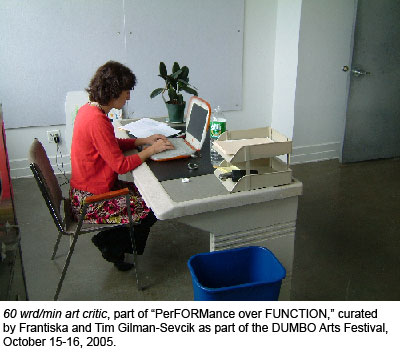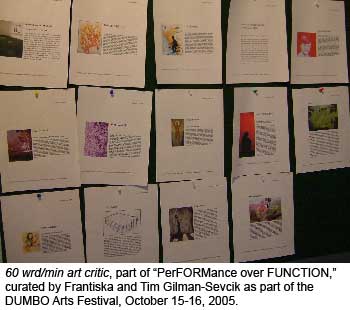
| The relationship between the artist and curator is culturally unique in its ability to make or break the career of the former. Relatively little critical attention, however, has been paid to criticism itself. Art historian and critic (and F News alumna) Lori Waxman has attempted to examine this relationship in her performance entitled 60 wrd/min art critic. Accompanied by an assistant, Waxman—currently a doctoral candidate at New York University’s Institute of Fine Arts and a writer for such publications as Artforum—provides something for everyone: as she says, “The writer gets a tear sheet, a couple of bucks, and some editorial gratification; the reader, in the best case scenario, gets a succinct, opinionated description of a body of work they probably did not see in person; and the artist gets published recognition and an entry for their bibliography.” 60 wrd/min art critic has previously been performed at such venues as P.S. 1 Contemporary Arts Center and Waxman has published portions of the exhibition’s product in The Believer. F Newsmagazine spoke briefly with Waxman on her upcoming performance. |
F Newsmagazine: How did 60 wrd/min art critic come about?
Lori Waxman: I had been writing 200-word reviews for artforum.com for over a year, turning them out progressively faster and better, and I began to realize that it was a skill worth exploiting for more than just the expected results. At the time I was also seriously dating a visual artist (now my husband) and becoming much more conscious of the ways in which critical response, or lack thereof, affects an artist on a professional but also a personal level. I had always had many artist friends, but this was when I really began to realize the undue power that my profession of art criticism affected over theirs as artists.
F: Is there any particular problem with art criticism that you’re attempting to solve?
 LW: Ultimately, this performance does not profess to solve or even to attempt to solve any problems, but rather to make them visible. The performance attempts to flip the contemporary practice of art criticism on its head, by giving control to the artist instead of the critic. Potentially this makes the process more democratic, by allowing the artist to choose what they want reviewed and when and under what terms (the artist decides what artwork and what information to disclose to the reviewer). It makes the critic visible in a way that he or she rarely is—except for someone like Jerry Saltz, we’re basically unrecognizable people who move around as surreptitiously as we like, with only our bylines showing in public. In the performance, I’m completely accessible to the artist, to the audience, to whomever wants to stare at or question me. I’m on the line, and I’m right there when the artist reads his or her review. Normally, if anyone’s on the line, it’s the artist. And then finally, or initially really, this project attempts to deal comically and literally with the fact that there are too many artists, too many galleries, and not enough critical venues to cover it all—too much worthy art goes unacknowledged by the art press. LW: Ultimately, this performance does not profess to solve or even to attempt to solve any problems, but rather to make them visible. The performance attempts to flip the contemporary practice of art criticism on its head, by giving control to the artist instead of the critic. Potentially this makes the process more democratic, by allowing the artist to choose what they want reviewed and when and under what terms (the artist decides what artwork and what information to disclose to the reviewer). It makes the critic visible in a way that he or she rarely is—except for someone like Jerry Saltz, we’re basically unrecognizable people who move around as surreptitiously as we like, with only our bylines showing in public. In the performance, I’m completely accessible to the artist, to the audience, to whomever wants to stare at or question me. I’m on the line, and I’m right there when the artist reads his or her review. Normally, if anyone’s on the line, it’s the artist. And then finally, or initially really, this project attempts to deal comically and literally with the fact that there are too many artists, too many galleries, and not enough critical venues to cover it all—too much worthy art goes unacknowledged by the art press.
F: In the press release for your performance you ask: "Do you need a review to get a show?" Do you think this is the case? It's a strange relationship, because it seems like without any sort of base level for consideration--like having a review under an artist's belt--the art world might be somewhat anarchic. A review still seems like it can be a somewhat arbitrary way for an artist to develop their sense of worth. How do you think the relationship between the artist, the review, and the career functions? How do you think it should function?
LW: Ideally an artist makes work of merit and someone offers to show it. This does happen, but it takes an immense about of connections, strength, charm, timing, dumb luck and not so dumb luck. We all know plenty of artists whose unexhibited work is better than what’s in the galleries. (And yes, plenty whose work should stay in the studio.) “Do you need a review to get a show?” is meant as a rhetorical question, but it does point to the importance of critical reception to the making of a career, especially in the beginnings of a career. The Catch-22 that I imply between getting reviewed and being shown is facetious but also not: written records hold a lot of weight. Anyone who has ever done art historical research knows this all too well. And while I don’t believe reviews should determine an artist’s self worth, clearly they affect it. More important, however, is how reviews provide a kind of reception, and reception is crucial to the life of a work. Most artists I know feel they don’t get enough feedback. This is one way of getting it. Finally, though, I hope the performance raises more questions than it answers about the worth of reviews.
 F: What is your ultimate goal in doing 60 wrd/min art critic? Is the performance more about you or about the artists you review? F: What is your ultimate goal in doing 60 wrd/min art critic? Is the performance more about you or about the artists you review?
LW: The performance isn’t about me, per se, though I learn much about the practice of criticism in acting it out in this way; in dealing with the challenge of uninteresting or just plain poor work; in the awkwardness of being present when the artist reads my words; and from myriad other angles. Nor is the performance about the artists I review, or even about their work. What the project is about is the contemporary practice of criticism and how it intersects with people and art.
F: Have you heard what the artists you've reviewed have done with the reviews you've given? Do you have any idea if they've been helpful or useful?
LW: Unfortunately I have no idea. But this is perhaps the aspect of the project that is most typical of how professional criticism normally works. Critics almost never, ever hear anything from the artist after the fact. In seven years of publishing reviews, I’ve received one thank you note and perhaps two or three emails. That’s it. But don’t get me wrong—I’m not complaining, much less suggesting that artists should be contacting critics. My point is rather that critics work in a kind of vacuum. As I mentioned above, that’s part of the purpose of this project. To get me out of the closet.
Lori Waxman will perform 60 wrd/min art critic at Mess Hall (6932 North Glenwood Avenue, Chicago), along with receptionist Ron Song on May 19 and 20. Artists are welcome to bring work for consideration between noon and six p.m. on a first-come, first-served basis. For more information, contact [email protected].
|